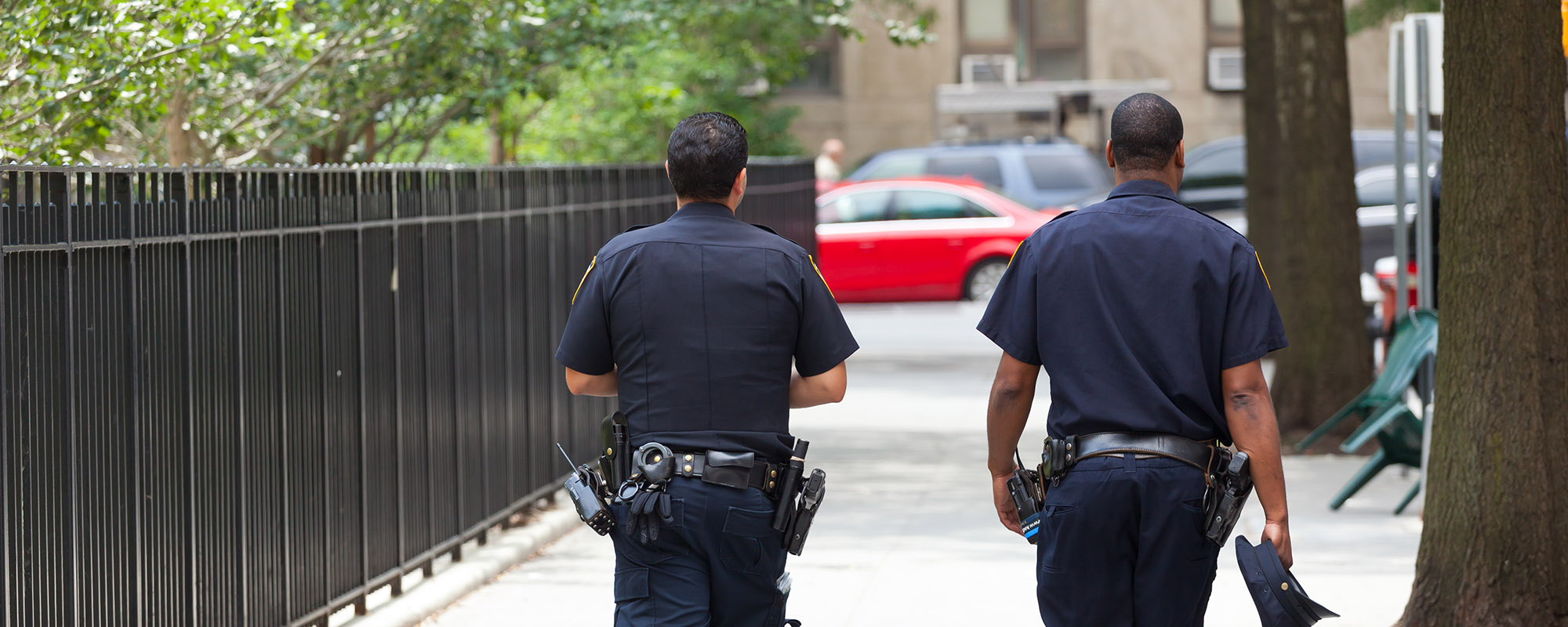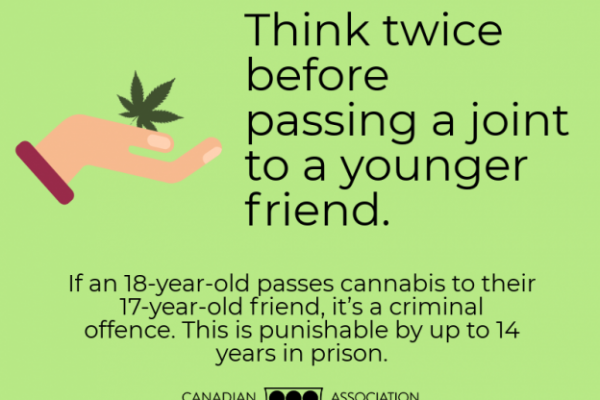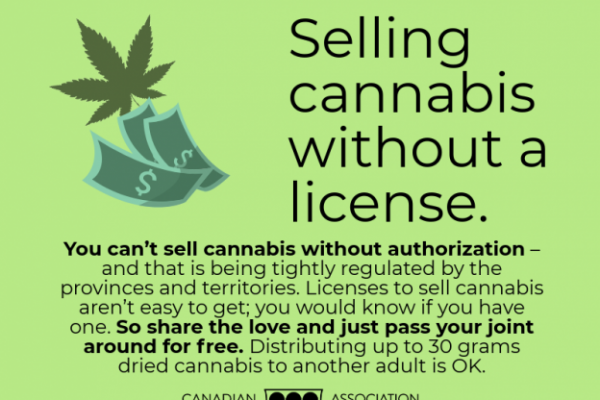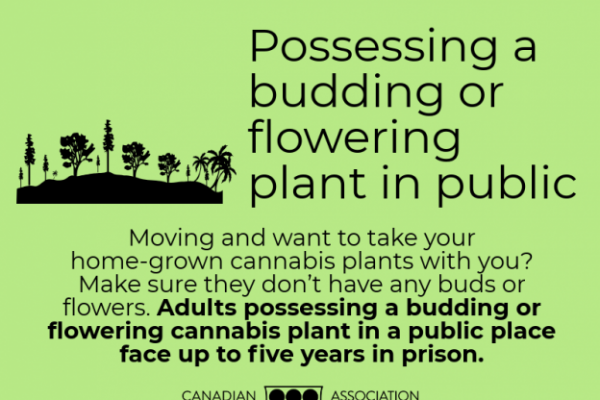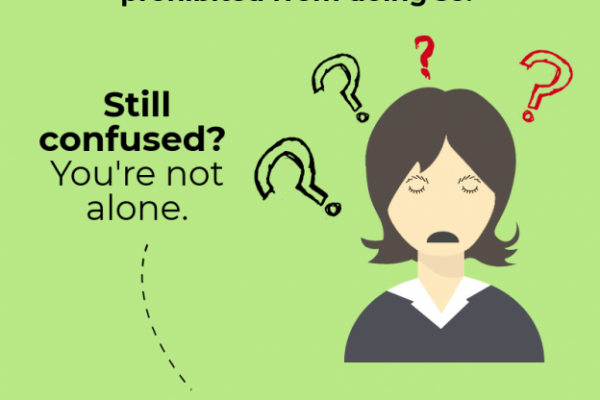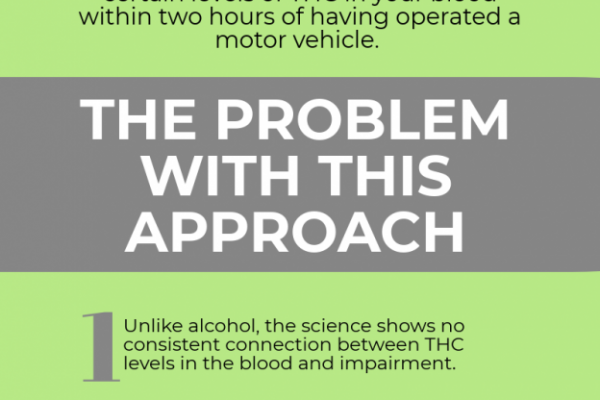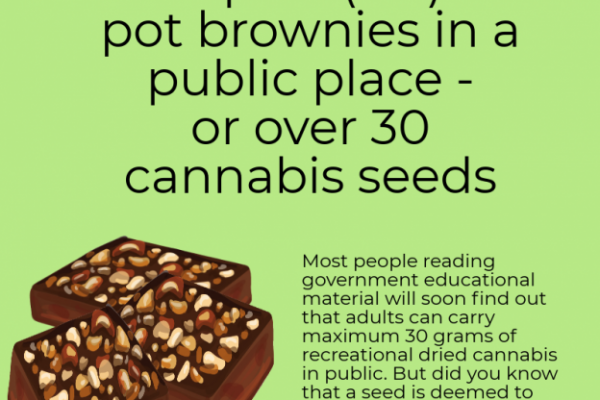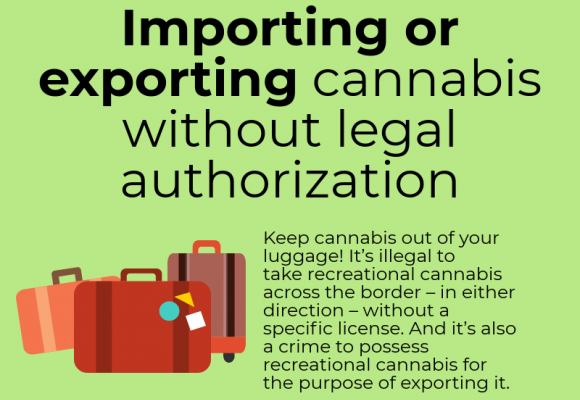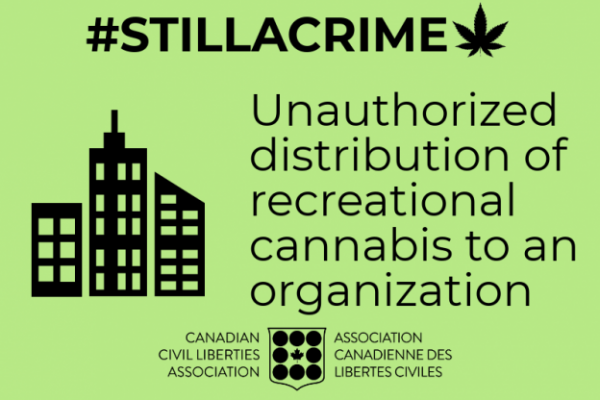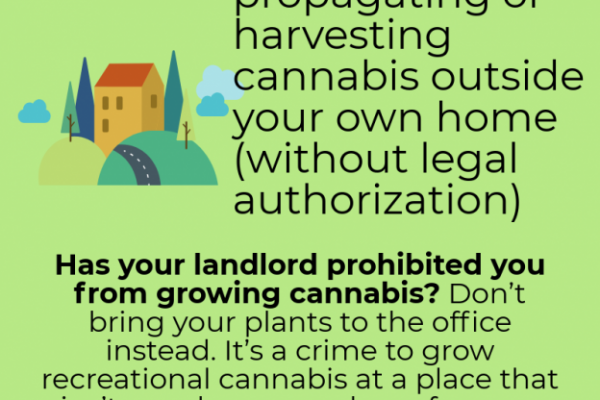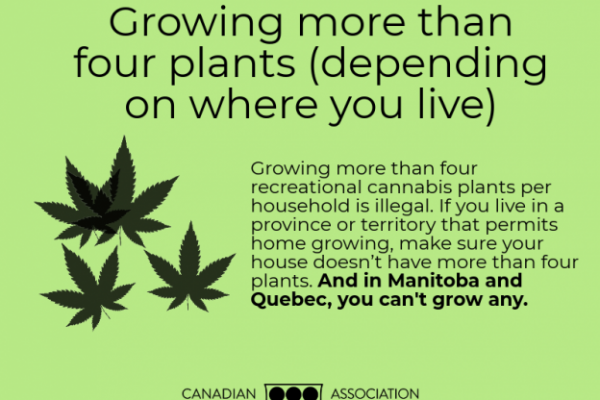The cannabis industry is being legalized – but there are still plenty of laws that can criminalize recreational cannabis users.
Here are ten new crimes that will come into effect on October 17th.
1. A PERSON 18 OR OVER DISTRIBUTING CANNABIS TO A PERSON UNDER 18
Think twice before passing that joint. If an 18 year old passes cannabis to their 17 year old friend, it’s a criminal offence – punishable by up to 14 years in prison.
“Distributing” means a lot of things – whether you give, transport, deliver, or transfer cannabis, or even offer to give your underage friend some, you can be found guilty of a criminal offence.
2. POSSESSING A BUDDING OR FLOWERING PLANT IN PUBLIC
Moving and want to take your home-grown cannabis plants with you? Make sure they don’t have any buds or flowers. You can move up to 4 plants in a public place – but if any of them are budding or flowering, it becomes a crime. Adults could face up to 5 years less a day in prison.
3. SELLING CANNABIS WITHOUT A LICENSE
This may seem obvious, but you can’t sell cannabis without specific legal authorization – and that is being tightly regulated by the provinces and territories. Licenses to sell cannabis aren’t that easy to get; you would know if you have one. So what can you do if you want to share a joint? Just give it away: distributing up to 30 grams dried cannabis to another adult is ok. Growing some cannabis at home, legally, and want to share the harvest with your adult roommate? Again, make sure to give up to 30 grams away, without getting anything in return. There are still a few murky areas though. What about picking up some cannabis for a friend when you go to the official cannabis store? You can certainly give that cannabis to the friend for free (as long as the friend is an adult, it’s less than 30 grams dried cannabis, etc. etc.). But can the friend pay you back? Maybe not. The real question here is, when does ‘distributing’ stop being ‘distributing’, and start to become ‘selling’? Unfortunately, we couldn’t find a clear answer to that – and you probably don’t want to be the first person to test out those definitions before a court. So the safest course of action is to give it away, or make your friends buy their own cannabis directly from an authorized retailer.
4. POSSESSING ANY “ILLICIT” CANNABIS, OR GROWING A PLANT FROM AN “ILLICIT” CANNABIS SEED
Hey, I thought we were legalizing cannabis – so what’s all this about “illicit” cannabis? Illicit cannabis is cannabis that is still illegal because it “is or was sold, produced or distributed by a person prohibited from doing so under [the Cannabis Act] or any provincial Act or that was imported by a person prohibited from doing so under this Act.“
Still confused? You’re not alone. Here are a few examples. If you have a friend that grows more than 4 recreational plants at home – that’s illicit cannabis. If you live in Quebec or Manitoba and grow anything recreational at home – that’s illicit cannabis. If you buy cannabis from an unlicensed or unauthorized source, or get more than 30 grams dried recreational cannabis (or over 30 seeds or 2 pans of pot brownies – see point 6 below) free from a friend – that’s illicit cannabis. Were you passed a joint from an 18 year old in BC, Saskatchewan, Ontario, Nova Scotia, Newfoundland or Nunavut? Or – if Quebec’s newly elected government gets its way – an 18, 19 or 20 year old in Quebec? That’s now illicit cannabis.
If you rent an apartment in PEI and your landlord has said no recreational cannabis growing but you do anyways – illicit cannabis.[5] If you live in BC and grow recreational plants in an area that is visible to the public – illicit cannabis.[6] If you live in New Brunswick and grow recreational cannabis in your yard, but it’s not in a locked enclosure at least 1.52 metres high – ILLICIT CANNABIS. You get the picture. Sort of.
Oh – and if you’re wondering why we keep talking about ‘recreational’ cannabis, it’s because medical marijuana users are subject to an entirely different regulatory regime. Basically, it’s complex.
5. DRIVING WITH A THC BLOOD CONCENTRATION OF OVER 2 NG/ML
This one is a bit of a stretch for our ‘top ten’ list, but only because these laws actually came into force in June 2018. Impaired driving – whether by drugs or alcohol – is, and continues to be, illegal. But there are new Criminal Code provisions that make it a crime to have certain levels of THC in your blood within two hours of having operated a motor vehicle. The difficulty with this approach is, unlike alcohol, the science shows no consistent connection between THC levels in the blood and impairment. And everyone clears THC from their body at different rates, making it very hard for people to know how long they need to wait before getting behind the wheel after having consumed cannabis. Heavy cannabis users – including some people who use medical marijuana – may have THC blood concentrations above the per se limit, despite having had a period of cessation for hours or possibly days.
Bottom line is that besides abstaining for a decent amount of time, there is no good way to be sure you’re complying with the law – which is particularly concerning when that law is the Criminal Code, and punishments range from a fine to jail time. The higher the concentration of THC in your blood, the higher the potential penalty. We can expect some legal challenges to this one.
6. AN ADULT POSSESSING OVER 30 SEEDS – OR MORE THAN TWO PANS(ISH) OF POT BROWNIES – IN A PUBLIC PLACE
Most people reading government educational material will soon find out that adults can carry maximum 30 grams of recreational dried cannabis in public. But did you know that a seed is deemed to be equivalent to a gram? If it’s a cannabis concentrate, the maximum amount is 7.5 grams. Pot brownies? Make sure that tray doesn’t weigh more than 450 grams. Don’t know what 450 grams of brownies looks like? We didn’t either. It’s just less than a pound – so this might help. And as with much of this stuff, this is about recreational cannabis – medical marijuana is a whole different question.
7. IMPORTING OR EXPORTING CANNABIS WITHOUT LEGAL AUTHORIZATION
It’s illegal to take recreational cannabis across the border – in either direction – without a specific licence. And it’s also a crime to possess recreational cannabis for the purpose of exporting it. So keep it out of your luggage.
8. CULTIVATING, PROPAGATING OR HARVESTING CANNABIS OUTSIDE YOUR OWN HOME (WITHOUT LEGAL AUTHORIZATION)
Live in an apartment and your landlord has prohibited you from growing cannabis? Don’t bring your plants to the office instead. It’s a crime to grow cannabis at a place that isn’t your home– unless of course you’re an authorized producer, with a legal licence. Or a medical marijuana user, in which case different rules apply.
9. DISTRIBUTING CANNABIS TO AN ORGANIZATION
Want to send your friend some weed? While it would be legal to give it away for free (provided it’s less than 30 grams dried and your friend is an adult), it would illegal to give it to a mail courier to help with the delivery. And organizations, unless specifically authorized, can’t possess, distribute, sell, cultivate, propagate, or harvest cannabis either. So much for your neighbourhood cannabis/book club.
10. NO MORE THAN FOUR PLANTS (DEPENDING ON WHERE YOU LIVE)
Growing more than four recreational cannabis plants per household (except in Quebec and Manitoba, where you can’t grow any) is illegal. If you live in a province or territory that permits home growing, make sure your house doesn’t have more than four plants. That includes your yard, shed, garage, etc.. And if you have roommates – it’s four recreational plants per house, not per person.
About the Canadian Civil Liberties Association
The CCLA is an independent, non-profit organization with supporters from across the country. Founded in 1964, the CCLA is a national human rights organization committed to defending the rights, dignity, safety, and freedoms of all people in Canada.
For the Media
For further comments, please contact us at media@ccla.org.

